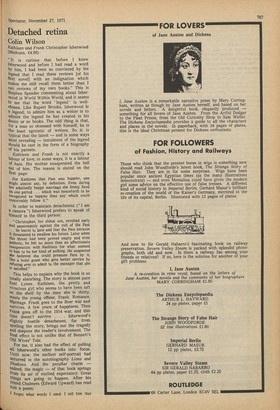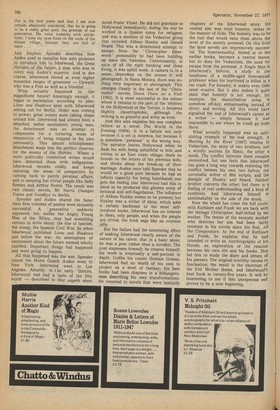Detached retina
Colin Wilson
Kathleen and Frank Christopher Isherwood (Methuen, £4.50) It is curious that before I knew Isherwood and before I had read a word by him, I had been so convinced by 'his legend that I read these reviews [of his first novel] with an indignation which makes me still recall them better than I can reviews of my own books." This is Stephen Spender commenting about IsherWood in World Within World, and it seems to me that the word 'legend ' is wellchosen. Like Rupert Brooke, Isherwood is a legend; to admire him as a writer is to admire the legend he has created in his dozen or so books. The odd thing is that, for a man so obsessed with himself, he is the ,least egotistic of writers. So it is typical that the latest — and in some ways Most revealing — instalment of the legend should be cast in the form of a biography of his parents.
Kathleen and Frank is not exactly a labour of love; in some ways, it is a labour Of hate. His mother exasperated the hell out of him. The reason is stated on the first page: For Kathleen that Past was happier, one might almost say, by definition. Even during her admitedly happy marriage she firmly fixed On one period . . . which was henceforth to be recognised as happier than any which could Conceivably follow it."
In order to maintain detachment (" I am a.camera ") Isherwood prefers to speak of himself in the third person: " Christopher, her eldest son, revolted early and passionately against the cult of the Past • . he learnt to hate and fear the Past because It threatened to swallow his future. Later when this threat had been proved empty and even Pathetic, he felt no more than an affectionate exasperation with Kathleen for what seemed to him to be her kind of sulking. He suspected sh: e believed she could pressure Fate by it, like a hotel guest who gets better service by refusing ever to admit to the manager that she is satisfied."
This helps to explain why the book is so totally absorbing. The story is almost pure East Lynne. Kathleen, the pretty and vivacious girl who seems to have been left O n the shelf by the time she is thirty, Meets the young officer, Frank. Romance. Marriage. Frank goes to the Boer war and survives. A few years of happiness. Then Frank goes off to the 1914 war, and this time doesn't survive . . . Isherwood's Slightly hostile detachment, far from spoiling the story, brings out the tragedy and deepens the reader's involvement. The final effect is not unlike that of Bennett's Old Wives' Tale.
For me, it also had the effect of pulling all Isherwood's other books into focus. Until now, the earliest self-portrait had occurred in the autobiography Lions and ,11.adows. And the peculiar charm — indeed, the magic — of that book springs from 'its air of excited expectancy. Great things are going to happen. After his friend Chalmers (Edward Upward) has read 'him a poem: I forget what words I used. I tell him that
this is his best poem and that I am now certain, absolutely convinced, that he is going to be a really great poet, the greatest of our generation. My voice trembles with excitement; I keep my eyes fixed on the roofs of the distant village, because they are full of tears . . .
And Stephen Spender describes how Auden used to tantalise him with promises to introduce him to Isherwood, the Great Novelist of the future, a man who was in every way Auden's superior. And in due course, Isherwood hinted at even higher mountain ranges of greatness — Upward, who was a Poet as well as a Novelist . .
What actually happened to this magnificent future? Amazingly enough, it began to materialise according to plan. Lions and Shadows ends with Isherwood setting out for Berlin. Hitler was coming to power; great events were taking shape around him. Isherwood had always been a detached, rather narcissistic young man; the detachment was an attempt to compensate for a torturing sense of immaturity, of being trapped in his own personality. This almost schizophrenic detachment made him the perfect observer for the events of the thirties. Where a more politically committed writer would
• have distorted them with indignation, Isherwood records coldly, and keeps restoring the sense of perspective by turning back to purely personal affairs, and to amusing but trivial people like Sally Bowles and Arthur Norris. The result was two classic novels, Mr Norris Changes Trains and Goodbye to Berlin.
Spender and Auden shared the fame; their first volumes of poems were instantly successful. A 'generation' suddenly appeared; but, unlike the Angry Young Men of the 'fifties, they had something serious to write about: the rise of fascism, the slump, the Spanish Civil War. So when Isherwood published Lions and Shadows just before the war, its atmosphere of excitement about the future seemed wholly justified. Important things had happened and were going to happen.
All that happened was the war. Spender joined the Home Guard; Auden went to New York. Isherwood went to Los Angeles. Aleardy, in t he early 'thirties, Isherwood had had a taste of the film world — described in that superb short
novel Prater Violet. He did not gravitate to Hollywood immediately; during the war he worked in a Quaker camp for refugees, and was a member of the Vedantist group that included Aldous Huxley and Gerald Heard. This was a determined attempt to escape from the 'Christopher Isherwood' personality he had been building up since the 'twenties. Unfortunately, in spite of all the right thinking and clean living, it was uphill work. A camera is, in a sense, dependent on the scenes lit will photograph. In Santa Monica, there was nothing very important to photograph. This emerges clearly in the last of the ' Christopher' novels, Down There on a Visit (1962). It is most successful in the scenes where it returns to the past of the 'thirties; in the Hollywood of the 'forties, it becomes slightly claustrophobic, although the writing is as graceful and witty as ever.
And this also explains his one complete failure as a novel: The World in the Evening (1954). It is a failure not only because it is set in America, but because it is somehow ' personal ' in the wrong way. The narrator leaves Hollywood when he finds his wife being unfaithful to him, and retires to an East coast village; there he broods on the letters of his previous wife, and thinks about the break-up of their marriage. Auden once told Spender that he would be a good poet because he had an infinite capacity for being humiliated; one gets the feeling that Isherwood had this in mind as he produced this gloomy story of betrayal and self-flagellation. The influence of Aldous Huxley seems to be present; but Huxley was a writer of !ideas, which adds a certain backbone to his most selfinvolved books. Isherwood has no interest in ideas, only people, and when the people are trivial, the book sags like an oversize jelly.
But the failure had the interesting effect of making Isherwood clearly aware of the nature of his talent: that in a basic sense, he was a poet rather than a novelist. The poet expresses himself; he creates himself; his work is eventually a self-portrait in depth. Unlike his cousin Graham Greene, Isherwood had no world of his own to project on a 'level of fantasy; his best books had been chapters 'in a bildungsroman describing 'his own transformations. He returned to novels that were basically chapters of the Isherwood story: the central aim was total honesty, rather in the manner of Gide. The honesty was to be the fuel that would raise them above the level of the merely personal. On this level the later novels are impressively successful. The homosexuality, hinted at in the earlier books, becomes a central theme; but so does the Vedantism, the need for escape from the personal. A Single Man 'is Isherwood's Inferno, a study in the loneliness of a middle-aged 'homosexual professor when his boyfriend is killed in a car crash. For honesty, it makes even Gide seem evasive. But it also makes it quite plain that honesty is not enough; for example, the masturbation scene is somehow off-key, embarrassing instead of direct and moving. All this could have signalled the end of Isherwood's career as a writer — simply because it was impossible to see where he Could go from there.
What actually happened was an astonishing example of his read strength. A Meeting by the River (1967) returns to Vedantism, the story of two brothers: one a wordly success (in films), the other a monk. The conflict between them remains unresolved, but one feels that Isherwood has gone a long way towards resolving the conflict betwen his own two halves: the successful writer of film scripts, and the disciple of Huxley and Heard. Neither brother converts the other; but there is a feeling of real understanding and a kind of synthesis. And Isherwood himself is unmistakably on the side of the monk.
Now the wheel has come the full circle: with Kathleen and Frank we are back with the teenage Christopher, half-stifled by his mother. The theme of the neurotic mother who destroys her son had been fairly constant in his novels since the first, All the Conspirators. At the end of Kathleen and Frank, he explains that he had intended to write an Autobiography of his Novels, an exploration of the relation between his own life and his books. This led him to study the diary and letters of his parents. The original hostility turned to fascination; the result is the exorcism of the Evil Mother theme, and Isherwood's best book in twenty-five years. It will be
interesting to see this unexpected end proves to be a new beginning.















































 Previous page
Previous page